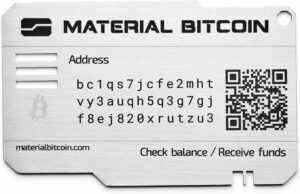Trezor is a crypto hardware wallet that has long had a respected place in crypto storage. It was...

Here you will find everything about cryptocurrency wallets. From definitions that you’ll appreciate if you are a beginner in the crypto world, to recommendations and reviews of the most popular crypto wallets on the market. You’ll also learn about the differences between the types of crypto wallets that exist and which ones are best for you:
Highlighted articles:

Trezor is a crypto hardware wallet that has long had a respected place in crypto storage. It was...

Crypto, in every aspect, is growing. And, with the increasing adoption of the cryptocurrency...

Recently, there have been growing concerns about Ledger’s security, especially regarding its...
The need for secure crypto storage is growing as global adoption increases and high-profile hacks become more...
If you’re just getting started in the world of crypto wallets, then you’ve probably come across two big names:...
Buying crypto today requires more knowledge and strategy than ever before. The market is evolving quickly, with...
We have all heard about Bitcoin, tokens, and non-custodial investments, but do you feel informed enough to expand into...
Hardware wallets are one of the most secure ways to store your Bitcoin and other cryptocurrencies. They are created to...
A cold storage wallet is a must if you’re serious about safeguarding your Bitcoin. In the first few months of 2025,...
If you are investing in Bitcoin or any other crypto, a reliable and secure crypto wallet is essential. Crypto wallets...
The Ballet Wallet is different from other traditional hardware wallets in that it has no electronic components. It...
At Material Bitcoin, we believe that securing your crypto is the only way to have true financial freedom. As leaders...
Storing crypto easily and effectively is what most of us are looking for. We want convenience and security within the...
Securing crypto in a cold wallet for ultimate protection against hacking is necessary. Cold crypto storage means that...
A cold wallet is a fully offline way to store Bitcoin and other crypto. This means that it's not connected to the...
Think of it as your personal vault, but instead of holding physical cash, it safeguards your digital assets securely in the digital realm. Essentially, it’s a software program or a physical device that stores your private keys, allowing you to manage, send, and receive various cryptocurrencies.
Now, let’s talk about the different flavors of crypto wallets. There’s quite a variety out there, catering to different needs and preferences.
Cryptocurrency wallets serve as digital containers for storing, sending, and receiving cryptocurrencies. Here’s how they function:
Storing Cryptocurrencies:
Sending Cryptocurrencies:
Receiving Cryptocurrencies:
Public and Private Keys:
Blockchain Integration:
Material Bitcoin prioritizes security and durability, offering a tangible, fireproof, waterproof, and shockproof metal plate for storing BTC, Ether, and USDT. With self-custody and physical seed phrase storage options, it ensures long-term safeguarding of your crypto assets.

✅ Pros:
❌ Cons:
Exodus Wallet strikes a balance between accessibility and security, providing a user-friendly platform for trading cryptocurrencies directly within the wallet. While it offers convenience for beginners, it’s recommended to pair it with cold wallet storage for enhanced security.

✅ Pros:
❌ Cons:
Cryptowallet.com caters to mobile users with its intuitive app, allowing on-the-go management of over 800 cryptocurrencies. With real-time market data, news updates, and 24/7 customer support, it offers convenience but comes with a higher risk of cyber threats.

✅ Pros:
❌ Cons:
Ledger and Ellipal Titan are hardware wallets offering cold storage for cryptocurrencies. While Ledger integrates with various exchanges, Ellipal Titan provides air-gapped security for offline asset management. Both prioritize customer service and security, though they come with a higher initial investment cost.

✅ Pros:
❌ Cons:
Each type of wallet comes with its own set of pros and cons, so it’s essential to weigh your priorities—whether it’s security, convenience, or accessibility—before selecting the perfect crypto wallet for your needs.
When it comes to fortifying your crypto fortress, there’s nothing quite like the security offered by non-electronic hardware wallets. These analog marvels provide an extra layer of protection against the ever-evolving threats lurking in the digital realm.
By storing your private keys offline, away from potential online threats, non-electronic hardware wallets elevate crypto security to unparalleled heights.
Now, let’s delve into why non-electronic hardware wallets are the pinnacle of crypto security:
What is the purpose of a crypto wallet?
What are the different types of crypto wallets available?
How do hardware wallets differ from software wallets?
Can I have multiple cryptocurrency wallets?
What happens if I lose access to my cryptocurrency wallet?
Are crypto wallets backups of keys secure?